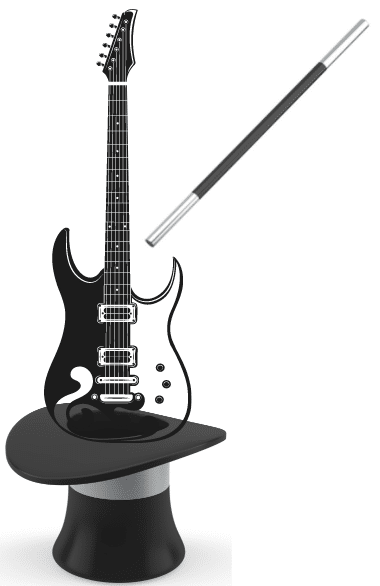
Have you ever asked yourself, “why is my guitar tone so bad?” If the answer’s yes, you came to the right place! This article will reveal some quick and simple things you can do to improve your tone immediately and other things you can do to see massive results!
Keep on reading to learn these must-have tips and tricks!
If you are in a hurry, click here to go directly to the tone troubleshooting guide.
You can use the table of contents below to take you to the area that interests you. Click on the little box to open it, and then click on the section of the article you want to read, or you can read from start to finish if you want the full guitar tone experience!
What Is Tone?
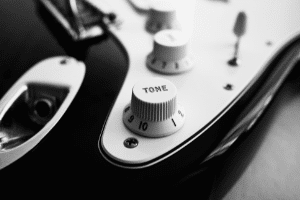
“Tone” can mean something a little different to various players and listeners. Although it’s hard to pin down exactly, most people agree that it dramatically affects the overall sound everyone hears.
To a certain extent, tone is in the ear and mind of the listener, but a really bad or exceptional tone is usually obvious. Sometimes the slightest change in playing technique or equipment can dramatically affect tone.
Tone îs a lot more complicated concept than how much treble, midrange, or bass a sound has. Professional musicians spend their entire careers “chasing” and perfecting their tone.

Tone Troubleshooting Guide
To improve your tone, you can use this guide to identify opportunities for improvement in your playing and equipment.
- Practice slowly with a metronome
- Work on improving your string muting (both hands)
- Put on a fresh set of guitar strings
- Get a setup done on your guitar
- Upgrade your guitar pickups – change to a noiseless single-coil or humbucker design
- Get a higher quality guitar cable
- Readjust the Volume and Master Volume controls on your amplifier to change the gain
- Use a noise gate pedal
- Put your time-based pedals (reverb, delay, chorus, phaser, & flanger) in your amp’s effect loop

Things That Can Affect Your Tone
Here are the things that can have the most significant effect on your overall tone. Each category can be broken down into individual factors that may need to be considered.
- Playing ability and style
- The guitar
- An amplifier and its settings
- Effects and accessories
- The playing environment
Keep On Reading To Learn More About Each Category

Playing Ability And Style
How well you play the guitar is undoubtedly the biggest determining factor of your overall tone. Do not underestimate the importance of technique, education, and experience in the quality of your sound!
Improving your understanding of music and developing your unique playing style will shape your tone. Although equipment has a lot to do with tone, it is secondary to playing ability and style.
Change Your Practice Routine
Look for opportunities to improve your tone in your practice routine.
Practice slowly with a metronome and find the speed at which you can play each note, so it rings out clearly. Gradually speed up your playing until you are up to speed with a clean and well-defined tone.
Work on string muting with both hands to remove extraneous noise. This is especially important if you play with overdrive, distortion, or fuzz!
Educate Yourself
Taking guitar lessons and teaching yourself to play well can both improve your tone. Choose the method that works best for you. The most important thing is to listen closely to each note that comes out of your guitar and strive to make it sound awesome.
Style Is Everything
Give any great guitar player, like Carlos Santana, a different guitar and setup (amp, effects, etc.), and their unique tone will still shine through. Their tone comes from their hands, and their style comes from their brain (“heart”). This is what makes them “sound like them,” with equipment playing a secondary role!
Related Article ➡ Is Playing A Guitar A Talent Or Skill? – Secrets To Success!

The Guitar You Play
Tuning
It seems obvious, but you might be surprised how many players don’t check their tuning before they play and during a performance. If your guitar is not in tune, your tone will go out the window, and you will sound bad, no matter how good you can play.
Even if you tune-up before you begin your practice session or set, your guitar can go out of tune while you are playing. Things like bending strings, using the whammy bar, and the temperature change from spotlights can affect your tuning.
Guitar Type, Make, Model, And Age
The tone of acoustic and electric guitars can vary. There are fewer things to adjust on an acoustic guitar than on an electric guitar, so getting the best tone out of an acoustic is generally more straightforward.
Each manufacturer makes their guitars a little (or a lot) different. This leads to differences in each guitar’s look, tone, and playability. Different models among the same manufacturer can have a drastically different tone. there’s a huge difference in the way a Fender Stratocaster and Telecaster sound!
Price range is the leading determinant of how a guitar sounds, plays, and looks. In life, you generally get shat you pay for. You can’t compare the sound of a bottom-of-the-line guitar to a PRS Private Stock instrument!
Some guitars sound better as they age, like a fine wine, and others don’t. It can depend on many things, like make, model, and construction. A ’59 Les Paul is considered the “holy grail” of this model guitar and can easily sell for $250,000 or more if it meets all the proper criteria for things like sound and collectability!
See Is A Heavier Or Lighter Electric Guitar Better? – It Depends, for more info.
Acoustic Guitars
An acoustic guitar’s size and construction (wood type, etc.) can determine its sound projection and affect its overall tone. Bigger acoustic guitars are generally louder but might not have the tone you are looking for.
Playing an acoustic guitar is one of the best ways to build finger strength, which can definitely help your tone.
Wood Type
The type of wood used to build an acoustic guitar has a definite effect on the instrument’s overall tone, so much so that guitar builders (luthiers) call them “tonewoods.”
Adirondack and Sitka spruce is commonly used for the top of acoustic guitars. Spruce helps make the top vibrate in synchrony with the strings to produce a bright, clean sound that is rich, balanced, and projects nicely.
Mahogany is denser and can have a more rounded and defined sound. Various other woods include cedar, maple, koa, and rosewood. These tonewoods are typically used to make the side and bottom of an acoustic guitar.
The bottom line is that although wood type affects a guitar’s tone, there are no “quick and easy” ways to know exactly how the combination of different woods will sound on an acoustic guitar without playing it.
Electric Guitars
Electric guitars have many more moving parts and electronics that can affect your tone. Here are some tone considerations that are particularly important for electric guitars, although some of them apply to acoustic instruments too.
Wood Type
As with acoustic guitars, there are no rules about the wood type carved in stone, but here are some generalizations regarding electric guitar necks and bodies.
For electric guitar necks, maple is bright and “cutting,” but adding a rosewood fretboard will make it warmer-sounding.
When it comes to electric guitar bodies, ash tends to be on the bright side, mahogany is more mellow sounding, and alder is somewhere between the other two.
Attaching the neck to the body of an electric guitar gives it an overall sound that combines the tonewoods from both pieces. Additionally, bolting the neck onto the body versus gluing it in will also affect the guitar’s tone and sustain.
Like acoustics guitars, I recommend you play each electric to appreciate its tonality fully. The best approach is to play it acoustically (unplugged) and then see what it will sound and play like through your favorite amp.
The bottom line is that even among professional builders, there is a great debate about tonewoods for electric and acoustic guitars, so you will ultimately have to decide for yourself.
Tuning Machines, The Nut, And The Frets
Tuning machines can affect your tone. If the strings slip on them when you play, they will go out of tune. Locking tuners prevent string slippage and string overwinding on the tuner post. Tuners with a higher gear ratio can tune strings more accurately.
The guitar nut is a crucial determinate of tone on both electric and acoustic guitars. It helps transfer the string vibration down the neck and into the guitar’s body. A locking nut can help keep your guitar in tune if you use a whammy bar aggressively.
The size and shape of a guitar’s frets can affect how you play and the instrument’s sound. Taller frets are generally better for bending strings with a clearer sound and more sustain. Frets that are not leveled correctly, pitted or worn down can cause problems with tone and intonation. They should be leveled and recrowned by a professional.
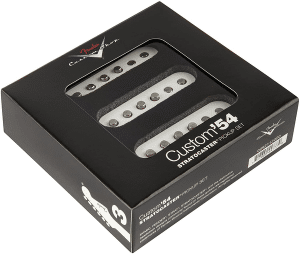
Pickups And Electronics
A guitar’s pickups are important tone determinants. The first thing to check is that your pickups are set at the proper height. Too low, and the sound will be thin. Too high and the magnetic pull on the strings can affect sound quality and intonation. If you change the type or gauge of your guitar strings, you may need to readjust the pickup height.
Single-coil pickups are noisier than humbuckers, especially if you play with high-gain or distortion. Coil tapping humbucker pickups will give you the tonal characteristics of both a single and double coil design.
Active pickups can give you more control over your guitar’s tone than passive pickups. The electronics of some active pickups have an onboard tone equalization circuit to adjust their bass, midrange, and treble independently.
Hey, check out my review article on Fender Custom Shop Stratocaster Pickups – Which Set Is Best?
Volume and tone pot (potentiometer) quality and resistance rating are important. They can have an audio, linear, or audio-linear taper. All these considerations are essential for getting the best tone. Poorly designed pots and pickup selector switches can add noise to your audio signal.
The capacitors used in a guitar’s electronic wiring are another consideration. You should use the proper size and highest-quality capacitors to help achieve the best sound. A treble-bleed modification helps retain the trebly sound of a pickup when the guitar’s volume knob is turned down.
The Bridge
The type of bridge and its adjustment on an electric guitar can be critical to the quality of the tone. Hardtail bridges give the best string vibrational energy transfer into the guitar’s body and are the easiest to keep in tune. Hardtail bridges with a string through-the-body design, like a Telecaster, give excellent tone quality.
Guitars with a whammy bar and vibrato bridge are harder to keep in tune, and their tonal characteristics tend to be “less Rich.” Double-locking (strings lock at the bridge and nut) tremolo systems usually sound and function best.
The vibrato block of a tremolo bridge is another vital tone determinant. Blocks made from steel, like those on the vintage Strats or high-end replacements (like Callaham), sound better than those made from steel alloy or zinc.
The number and placement of springs in the tremolo cavity can also affect tone. Most guitarists use three springs instead of a maximum of five. Too many springs can add an overabundance of acoustic reverb to the guitar and make it harder to use the tremolo bar.
Guitar Strings And Action Adjustment
Guitar strings are a critical tone factor for any type of guitar, acoustic or electric. It can take a player years to find the string set gauge and brand that give the best tone for each particular guitar. There is no “best brand” of guitar strings. It comes down to personal choice.
Generally speaking, the thicker the string gauge, the better the tone. I used a Dan Armstrong 0.007 (high-E) set way back when I was in high school. They were wonderful for bending strings and playing fast, but they killed my tone. There’s always an exception to the rule, like Billy Gibbons, who uses a 0.007 Dunlop string set and gets a fabulous sound.
The other option is to use a thicker gauge string set and tune down. I keep my Jimi Hendrix Signature (Voodoo Child) guitar tuned down to Eb with 0.011 Ernie Ball strings. It makes the strings easier to bend while retaining the richer tone and allowing me to use open-string root notes and harmonics in the key of Eb.
Stainless steel string sets are louder (more pickup audio signal) and brighter. Pure nickel-wrap strings give a duller and more rounded “vintage” tone. Nickel-plated steel strings have a more balanced tone, in between stainless steel and pure nickel wrap.
There are also various other string types to consider, such as “cobalt” (an iron and cobalt blend), etc. Stings can also be “coated” to prolong their “play life,” decrease string noise, and improve tone.
Change your strings often, especially if you play the same guitar often. Worn-out strings are dull-sounding with a loss of harmonics, go out of tune, and can affect intonation.
Your guitar’s action (string height from the underside of the strings to the top of the frets) needs to be adjusted to accommodate the gauge of the strings to get the best tone.
Guitar Picks
Guitar picks are often overlooked as a source of guitar tone. Compare the sound of several different picks that vary in material composition, shape, and thickness (stiffness), and you will hear and feel the difference. Like guitar strings, finding the right pick is a matter of trial and error.
After many years of experimentation, I prefer the red Dunlop Jazz III pick for electric guitar playing. It gives me the size, shape, and stiffness I need to get the tone and harmonics I like.
Playing Mechanics
Proper playing mechanics can make the difference between killer and substandard tone. I wish I had a nickel for every guy I heard shredding at the speed of light at the Guitar Center but with a crappy tone.
High-quality picking mechanics starts with developing good habits like the proper guitar height and arm placement.
String muting with the picking and fretting hands is vital, especially if you play with overdrive, distortion, or fuzz. As a beginner, it took me a while to realize that there’s “articulate distortion” where every note sounds good and “sloppy distortion,” where it’s difficult or impossible to hear each note clearly.
It’s also essential to master the art of note dynamics so that not every note has the same volume and attack. Techniques like artificial harmonics (pinch, harp, etc.) and chicken picking can add interest to your playing and emphasize tonal characteristics. It all helps you build a great tone in your playing.
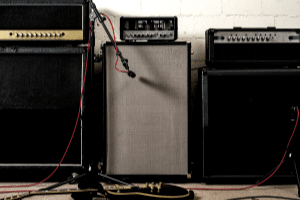
The Amplifier You Use
Even if you play acoustic guitar onstage, the chances are that you have it mic’d into the house PA system or plugged into an acoustic guitar amp.
Electric guitar players know how vital their amp is as part of the signal chain because it’s what the audience hears when the sound comes out of the speakers.
Amps For Different Musical Styles
There are a variety of amplifiers, some of which are specifically designed to accommodate a particular musical genre(s). Some amps are better for playing Rock and Blues, while others are made to be high-gain to cater to metal guitarists. Still, other amps work better for Country and Jazz.
Check out the amps your favorite players use to get you pointed in the right direction. Rock and metal players typically favor Marshall and Blackstar. Country and Blues players gravitate to Fender amps, while Jazz players commonly use Roland amplifiers.
There are no hard and fast rules; ultimately, it comes down to the sound you like best.
If you play a variety of musical genres, there are plenty of excellent “all-purpose” amps. “Clean” amplifiers usually work best because you can make them distort or get any sound you want with the right guitar and effects pedals.
Some guitar players use two amplifiers simultaneously to get a “mixed” tone. For example, one amp for clean sounds and the other for dirty tone, or one for running dry (no effects) and the other wet (with effects).
Amplifier Type
Some amps are noisier than others. Although noise is different than tone, noise detracts from the overall tone and quality of your music.
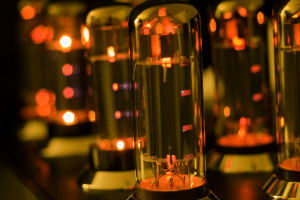
Class A tube amplifiers are generally noisier than Class AB tube amps. Solid-state amps can be less noisy than tube amps. If you have a tube amp, the tubes may need to be replaced or re-biased as they age. A poorly functioning or defective tube may become noisy and can change the tone of the sound.
Don’t try to service your amp if you don’t know what you’re doing. You could damage the amplifier and expose yourself to a dangerous electrical hazard.
One Size May Not Fit All
If you’re someone who wants a practice amp with great tone at bedroom-friendly sound levels, you can get a low-powered (1 to 5 Watt) amp and open it up or buy a larger amp with a master volume control.
If you want to play outdoors and in large venues, you’re probably looking at 50 to 100 Watts of power with stacked speaker cabinets. If you love the sound of your small amp, you can mic it into the PA to get more volume.
Some players use an amplifier that has multiple power selections, like 1, 5, 10, and 50 Watts, to allow them to “open the sound of the amp up” at different volume levels while retaining their tone. The possibilities are only limited by your imagination and budget.
Adjusting The Controls
The amplifier’s control panel is where a lot of the guitar’s tone-shaping takes place via the preamp and amp sections. Common controls can include knobs for Volume, Master Volume, Bass, Mid, Treble, and Reverb. Players learn to set the controls to get the tone they need for various musical styles.
Speaker Enclosures
Speaker enclosures can affect your tone by changing the speaker(s) performance characteristics.
Larger cabinets can have more of a bass response than smaller ones. Open-back cabinets can provide a less directional and more room-filling sound than a closed-back design.
Speaker Type And Configuration
An amplifier’s speakers can have a significant effect on tone. Here are some of the things that can define a speaker’s sound.
- Brand and Model (Celestion Greenback, etc.)
- Size (8, 10, 12 inches)
- Impedance (4, 8, 16 Ohm)
- Power rating (15, 50, 100 Watt)
- Wiring configuration (parallel, series, series-parallel)
You can change the speaker brand and model, but you have to be sure to use the proper size, impedance, power rating, and wiring configuration to avoid damaging your amplifier.
If you’re in the market for a great amp, check out my article on Best Combo Guitar Amps For Any Budget: 5 All-Tube Beauties!.
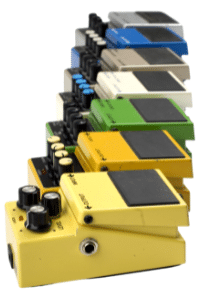
The Effects And Accessories You Choose
If you play with effects like stomp boxes, be aware that they can affect your tone, even your amp’s built-in reverb.
Effect pedals that feature true-bypass help preserve your tone by taking the pedal’s circuit out of the signal chain when it is not in use. If you use several stomp boxes that are not true-bypass, each one will weaken the audio signal from your guitar, even if the pedal is turned off.
Overdrive, Distortion, And Fuzz
These effects are designed to spike the front end of your amplifier. They should always go between your guitar and the instrument input jack of your amp.
They can adversely affect your tone, especially if you use multiple pedals simultaneously (gain stacking).
It is essential to use the proper string muting and picking techniques to keep all your notes distinguishable from each other and your tone crisp. Turning down the volume control on your guitar can be helpful, especially when playing chords.
Time-Based Effects
Put your time-based pedals (reverb, delay, chorus, phaser, & flanger) in your amp’s effect loop.
If your amp does not have an effects loop, putting all your effects in the right order is essential. Here is a good way to combine them, but you’ll have to experiment to see what works best for you.
(guitar) -> Tuner -> Wah Wah Pedal -> Compressor -> Overdirve/Distortion/Fuzz -> Modulation (tremolo, chorus, phase shifter, & flanger) -> Reverb/Delay -> (amplifier input jack)
The Guitar Cable
Your guitar cable (cord) can affect your tone by degrading your audio signal as it goes from your guitar into your amp or effects pedal(s). This is a very low-level signal and must be well shielded from external electromagnetic interference.
I have experimented with all types of guitar cables over the years. Any mid-priced brand-name cable should work well. It can be challenging to hear the improvement in a more costly cable to the degree that it would justify its purchase.
A cable that is too long can adversely affect your tone due to its increased resistance and changes in capacitive and inductive reactance. Try to keep it no longer than 10 to 15 feet, or 20 feet max.
I have a Paul Reed Smith guitar with a “Sweet Switch” factory-installed in place of the tone knob. Supposedly, Carlos Santana wanted Paul to build him a guitar with a circuit that duplicated the sound he got when he had it plugged into a very long guitar cable.
You can definitely hear the change in tone when you turn it on, which is helpful in some playing situations but less versatile than a tone knob. I still have the guitar because it plays great and was autographed by Paul Reed Smith.

The Playing Environment
Your playing environment can have a lot to do with your tone. If you play in a very small or quiet room, you are more likely to hear noise from your amp that can overpower the quality of your tone.
The walls may be optimized for tone in a recording environment with acoustic tiles, bass traps, or other coverings. Getting your tone right is critical since the recording will represent who you are as a musician.
You may be able to improve your recorded tone “post-production” by processing it in a digital workstation (DAW), but you shouldn’t count on the engineer to get your sound right.
Playing in large venues or outdoors requires more sound, either with bigger amplifiers or by mic’ing the amps into the PA system. The sound engineer can adjust your guitar signal at the mixing board to help optimize your tone.
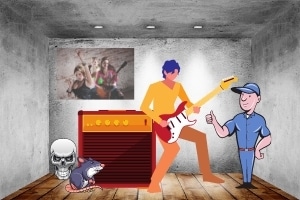
Advantages Of Good Tone
Here are some of the main advantages of having a good tone.
- Your guitar playing will sound professional
- You will stand out more in the band
- It will motivate you to come up with new ideas
- You can play chords and solos with distortion or fuzz, and every note will be sound musical
- It will make you feel good about your playing
- It can make a cheap guitar sound great

Disadvantages Of Bad Tone
There are many disadvantages to having a bad tone. Here are some of the most important ones to consider.
- You may sound “off ” when your guitar is tuned properly
- Guitar chords and solos may sound indistinct or “muddy”
- It can be discouraging and prevent your playing from improving
- Even an expensive guitar can sound cheap
- It can make you sound like a beginner, even if you are more of an advanced player
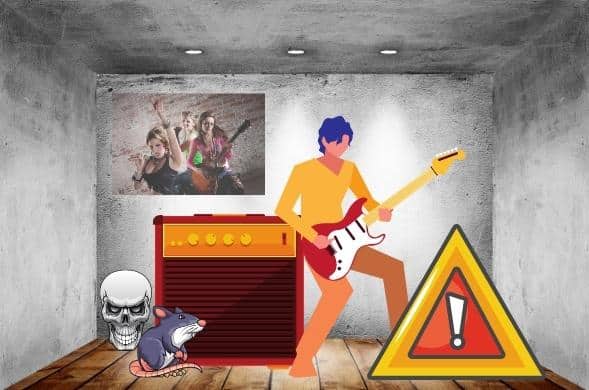
Beware Of “Tone Complacency”
It can be easy to become complacent about your tone, especially when you are just beginning to play the guitar.
When I first started playing many years ago, all I really cared about was being able to shred solos. I used distortion and sustain to cover up my mistakes and lack of precision. I fooled myself and some listeners into thinking I sounded good, but my underlying tone and technique were fundamentally poor.
To develop a good tone, it’s essential to play slow, without effects, so you can hear what each note sounds like. Use a metronome and play as slow as required to make everything sound good and on time. Learn to mute strings with both hands, so there is no extraneous noise or unwanted notes.
Record videos of yourself playing to critique your technique and tone. Practice both sitting and standing because they can require very different hand movements to make everything sound good.
When your playing sounds good without an amp or amplified without effects, adding effects pedals can make you sound great!
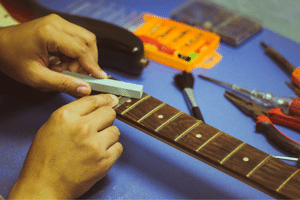
Are You Qualified To Make Guitar Adjustments Or Modifications?
It’s great to work on your guitars, especially if you have a lot of them, but you should always be aware of your limitations.
Adjusting things like an electric guitar’s string height (action) or pickup height can be straightforward. Still, some adjustments require the proper training and experience, like adjusting a guitar’s truss rod.
When you doubt your ability to adjust, repair, or modify your guitar, it’s always best to bring it to a competent guitar technician or luthier (guitar designer & builder). You can permanently damage your guitar, and it might never play and sound right again!
Making modifications to your guitar can void its manufacturer’s warranty and cause permanent damage to the instrument. Certain modifications are irreversible, so you may be stuck with them, even if you desperately want to restore the guitar to its original condition!
I learned that the hard way over the years until I did a three-year apprenticeship in a guitar repair shop. Now I have my own home workshop with the proper training and equipment to safely maintain and repair all my instruments.
Remember: “When In Doubt, Send It Out!”
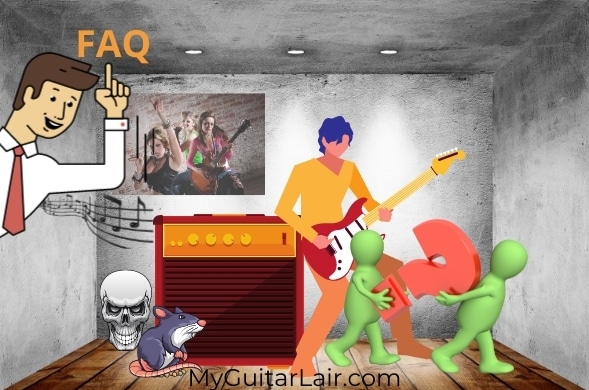
Frequently Asked Questions
Here are some of the questions guitar players ask me about tone.
If your question does not appear here, please put it in the comments, and I will get right back to you with an answer.
Does Body Shape Affect Tone?
Yes, it can. This can happen with acoustic and electric guitars. With acoustic guitars, it’s mostly the size of the body that matters. With electrics, the shape and thickness can be important factors. Guitars like a Les Paul, which do not have an upper horn with a thicker (heavier) body, have more wood to affect tone and increase sustain.
Why Do Old Guitars Sound Better?
Old guitars can sound better than new ones for a variety of reasons. As the guitar’s wood ages and loses water content, it can become lighter and more resonant, improving tonality and sustain. The sound of a guitar’s pickups can also change, for better or worse.
Older guitars may have been built differently, like using a “slab” rosewood fretboard or PAF humbuckers in electric guitars, both of which are coveted among collectors for their sound.
Can You Wear Out A Guitar?
Yes, even if you take good care of your guitar, you can wear out things like the frets and the pickup selector switch. A certified guitar tech or builder can usually correct regular wear and tear on a guitar.
What Affects Guitar Tone The Most?
With acoustic guitars, it is the combination of tonewoods, the body size, and how it is constructed. For electric guitars, it’s the tone woods and their thickness, the electronics, and the hardware.
What Makes The Biggest Difference In Guitar Tone?
The number one thing that makes a difference in guitar tone is probably the price range of the instrument. With a guitar, you basically get what you pay for. An acoustic or electric guitar in a much higher price range will probably sound and play better than one in a lower price range.
For example, compare a Fender Custom Shop Masterbuilt guitar to a guitar in their “Squier” range, and you will quickly notice the difference!
Why Does My Guitar Sound Buzzy?
The most common reason, especially among electrics, is that the action (distance between the top of the frets and the bottom of the strings) is set too low. Worn-out strings and frets and a neck that needs a truss rod adjustment are other causes.
Why Does My Guitar Sound Dull?
All guitars have a certain amount of “dullness” or “brightness,” depending on how the instrument was constructed. If the sound of your guitar suddenly becomes dull, it’s probably time for a new set of strings.
Why Does My Guitar Sound Tinny?
Many things can affect the “tinniness” of a guitar’s sound, which is mainly noticed on electrics, like string type or age (new strings can sound bright), pickup type or height, and how the action is set up.
If your electric guitar has a tinny sound, it can be improved by changing the tone settings on your amp, using a graphic equalizer, or changing settings in your recording studio software.
How Long Does It Take For New Guitar Strings To Settle?
New guitar strings can take one to several hours to “settle.” The best way to keep new strings from going out of tune is to stretch them after putting them on the guitar. It’s also essential to wind them on the tuning posts without overlapping turns of the string.
New strings that are too bright sounding need to be “played in,” which can take several days or weeks, depending on how much you play the guitar.

Final Thoughts
Guitar tone can be a tricky thing to define in general terms. Many things can affect each guitar’s tone, but your playing ability and style are the most common. A good player can get the best tone out of most guitars.
Beware of “tone complacency,” especially when first learning to play the guitar. Use a metronome during practice sessions and play at a speed that gives you good tone, picking dynamics and string muting.
The type of wood (aka “tonewood”) used in the construction of a guitar can significantly affect its tone. Wood can change a guitar’s tonality as it ages and begins to dry out.
More things can be adjusted on an electric guitar than on an acoustic guitar to improve its tone. If you amplify your guitar, different tone control settings and effects pedals can help improve your sound.
The type of guitar strings and picks you use can also affect how your guitar sounds and plays. It’s important to understand the effect your playing environment can have on your guitar’s tone and some things you can do to improve it.

Never make adjustments or modifications on your guitar to improve its tone unless you know what you are doing. You could cause permanent damage to the instrument.
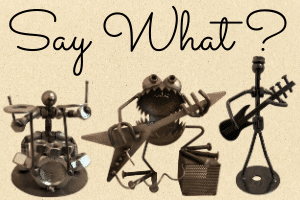
Tell Me What You Think
Please leave a comment below if you enjoyed this article, have any questions about guitar tone, or want to give your point of view. I will be happy to help you.
- Are you happy with your guitar’s tone?
- Have you made any adjustments or modifications to improve your guitar’s tone? What?
- What amplifier or effects pedal(s) are you using to improve your guitar’s tone?
- Did this article help you find ways to get good guitar tone?
- What else is on your mind?



Very interesting as a total beginner in guitar playing I was not aware of how the different types of wood that the guitar is made from would affect the tone. Also how even stage lights and temperature can have an effect. I do understand that the way you play and your musical abilities play a part too but as a beginner I found your information very informative.
Hi, Ruth
Thank You for your comments!
You don’t need to spend a lot of money on a guitar, especially as a beginner. Most of your tone will come from practicing all the playing techniques correctly.
If your guitar sounds bad, one easy thing you can do is to put on a new set of strings. If you still think there is a problem with your guitar, bring it to a certified guitar technician. It may need a simple adjustment to make it play and sound better.
Have Fun Playing & Learning!
Frank 🎸
I haven’t played guitar since I was in the 6th grade and at the beginning of this year I decided to give it a try again. I still remembered some of the notes, but my only concern was that my arthritis wasn’t letting me perform as I used to, or at least as what I was expecting. This guide is truly going to help me improve my skills – not to mention that I’m in need of some new strings.
Hi, Stephanie
Thank You for your comments!
First, I’m thrilled that you decided to play your guitar again!
Sorry to hear about the problems with arthritis in your hands. Please check out the article on my website entitled: “Playing Guitar With Arthritis: Overcoming Your Hand Problems.” Take it slow, and don’t give up!
Frank 🎸